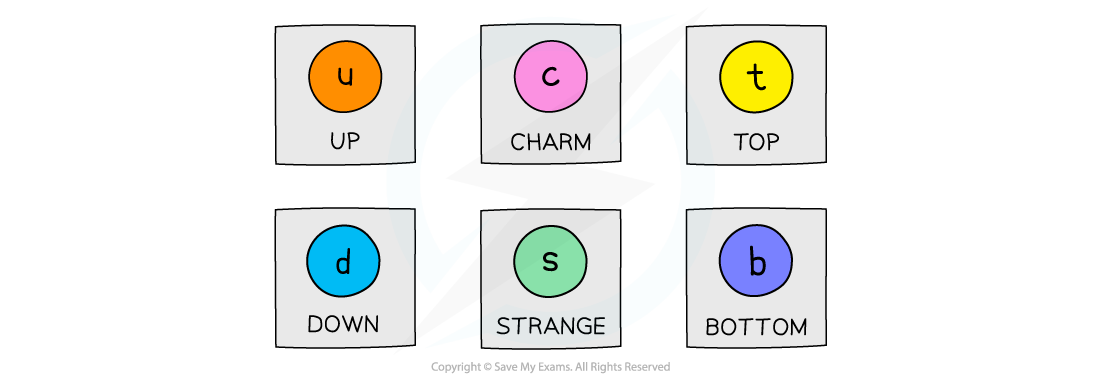Fundamental Particles (Cambridge (CIE) A Level Physics): Revision Note
Exam code: 9702
Fundamental particles: quarks
Quarks are fundamental particles that make up other subatomic particles such as protons and neutrons
Protons and neutrons are in a category of particles called hadrons
Hadrons are defined as any particle made up of quarks
Fundamental means that the particles are not made up of any other particles
Quarks have never been observed on their own, they are either in pairs or groups of three
There are six flavours (types) of quarks that exist:
up
down
charm
strange
top
bottom
The six flavours of quarks

The six flavours of quarks are up, down, charm, strange, top and bottom
Fundamental particles: leptons
Leptons are also a group of fundamental (elementary) particles
This means they are not made up of any other particles (no quarks)
There are six leptons altogether:
electron
electron neutrino
muon
muon neutrino
tau
tau neutrino
The six leptons

The six leptons are all fundamental particles
The muon and tau particle are very similar to the electron but with slightly larger mass
Electrons, muon and tau particles all have a charge of -1e
There are three flavours (types) of neutrinos (electron, muon, tau)
Neutrinos are the most abundant leptons in the universe
They have no charge and negligible mass (almost 0)
Leptons interact with the weak interaction, electromagnetic and gravitational forces
However, they do not interact with the strong force
Although quarks are fundamental particles too, they are not classed as leptons
Leptons do not interact with the strong force, whilst quarks do
Worked Example
State all the anti-leptons in the following decay equation.
Answer:
The pion (π+) is a meson (a type of hadron) and is made up of quarks
Therefore it is not a fundamental particle and hence not a lepton
The anti-muon (μ+) is the anti-particle of the muon
Therefore it is an anti-lepton
The muon neutrino is a lepton, not an anti-lepton
The anti-lepton would be the anti-muon neutrino
Therefore, the only anti-lepton is an anti-muon (μ+)

Unlock more, it's free!
Was this revision note helpful?
